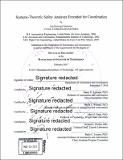Systems-theoretic safety analyses extended for coordination
Author(s)
Johnson, Kip E. (Kip Edward), 1978-
DownloadFull printable version (55.07Mb)
Other Contributors
Massachusetts Institute of Technology. Department of Aeronautics and Astronautics.
Advisor
Nancy G. Leveson.
Terms of use
Metadata
Show full item recordAbstract
When interdependent conditions exist among decision units, safety results in part from coordination. Safety analysis methods should correspondingly address coordination. However, state-of-the-art safety analysis methods have limited guidance for analytical inquiry into coordination between interdependent decision systems. This thesis presents theoretical and applied research to address the knowledge gap by extending STAMP (Systems-Theoretic Accident Model and Processes)-based analysis methods STPA (System-Theoretic Process Analysis) and CAST (Causal Analysis based on STAMP). This thesis contributes to knowledge by introducing: 1) a coordination framework for use in analysis, 2) STPA-Coordination and CAST-Coordination, which extend STPA and CAST to analyze coordination, and 3) flawed coordination analysis guidance for use in the extensions. The coordination framework provides explanatory power for observation of and analysis of coordination in sociotechnical systems. The coordination framework includes perspectives for use in the evaluation of coordination, which are used to operationalize the framework for analysis. STPA-Coordination extends STPA with additional steps for analysis of how coordination can lead to unsafe controls (i.e. hazards). In part, STPA-Coordination uses analysis guidance introduced in this thesis that consists of four unique flawed coordination cases and nine coordination elements. CAST-Coordination extends CAST with additional steps to investigate accident causation influences from flawed coordination. Two case studies evaluate the utility of extensions, flawed coordination guidance, and the framework. One case study investigates the application of STPA-Coordination to a current and significant sociotechnical system challenge-unmanned aircraft systems integration into military and civil flight operations. Results are compared to official functional hazard analysis and requirements results. The comparison shows that STPA-Coordination provides additional insights into identifying hazardous coordination scenarios and recommendations. Another case study applies CAST-Coordination to investigate a Patriot missile friendly fire (2003) during Operation Iraqi Freedom, which is a relevant concern today. CAST-Coordination is successfully applied to the friendly-fire coordination problem. When compared to official government accident investigation reports, CAST-Coordination shows benefits in identifying accident influences and generating recommendations to address the coordination and safety problem. Both case study quantitative and qualitative results are promising and suggest STPA- and CAST-Coordination and the coordination framework are useful.
Description
Thesis: Ph. D., Massachusetts Institute of Technology, Department of Aeronautics and Astronautics, 2017. Cataloged from PDF version of thesis. Includes bibliographical references (pages 191-199).
Date issued
2017Department
Massachusetts Institute of Technology. Department of Aeronautics and AstronauticsPublisher
Massachusetts Institute of Technology
Keywords
Aeronautics and Astronautics.